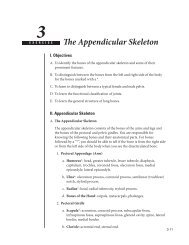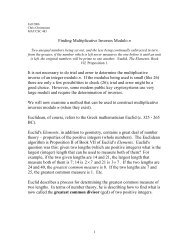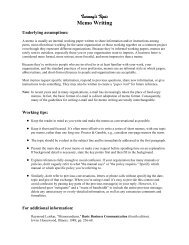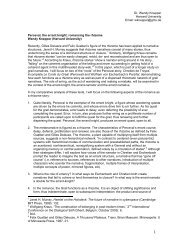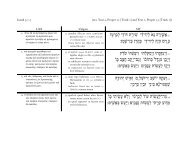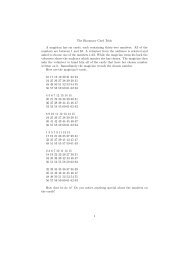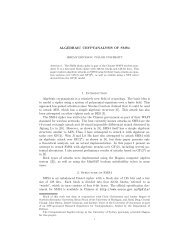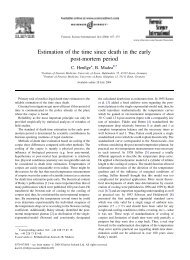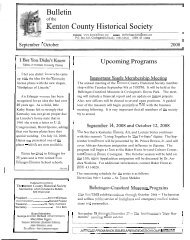An-Nawawi's 40 Hadith
An-Nawawi's 40 Hadith
An-Nawawi's 40 Hadith
Create successful ePaper yourself
Turn your PDF publications into a flip-book with our unique Google optimized e-Paper software.
Selections from <strong>An</strong>-Nawawī’s Forty Ḥadīth Page 2<br />
for though you cannot see Him, yet He sees you.” He said, “Then tell me about the Hour 9 . He<br />
said, “About that the one questioned knows no more than the questioner.” He said, “Then tell me<br />
about its signs.” He said, “[They are] that the slave-girl will give birth to her mistress 10 and that<br />
you will see the barefooted, naked, destitute herdsmen building arrogantly high houses. 11 Then he<br />
took himself off and I stayed for a time. Then he [Muḥammad] said, “O ‘Umar, do you know<br />
who the questioner was?” I said, “Allah and His Messenger know best.” He said, “It was<br />
Gabriel, who came to you to teach you your religion.”<br />
Muslim relates this.<br />
3 On the authority of Abū ‘Abd ar-Raḥmān ‘Abdullah, the son of ‘Umar ibn al-Khaṭṭāb (may Allah be pleased with<br />
him), who said: I heard the Messenger of Allah (the blessings and peace of Allah be upon him) say:<br />
Islam has been built on five [pillars] 12 : testifying that there is no god but Allah and Muḥammad is<br />
the Messenger of Allah, performing the prayers, paying the zakāt, making the pilgrimage to the<br />
House, and fasting during Ramaḍān.<br />
al-Bukhārī and Muslim relate this.<br />
4 On the authority of Abū ‘Abd ar-Raḥmān ‘Abdullah ibn Mas’ūd (may Allah be pleased with him), who said: The<br />
Messenger of Allah (the blessings and peace of Allah be upon him) and he is the truthful, the reliable, reported to us:<br />
Verily the creation of each of you takes place when he is brought together in his mother’s womb.<br />
For forty days [he is] as a drop, then he similarly becomes a clot, and then similarly [he becomes<br />
like] a bite of meat. Then an angel is sent to him, and he blows the spirit [of life] into him. He<br />
[the angel] is commanded about four matters 13 : that he write down his fortune, his life-span, his<br />
works, and [whether in the Afterlife he will be] unhappy or happy. By Allah, other than Whom<br />
there is no god, verily one of you may work the works of the people of Paradise until there is but<br />
an arm’s length between him and it and that which is written will overtake him so that he works<br />
the works of the people of the Fire and he enters it. <strong>An</strong>d one of you may work the works of the<br />
people of the Fire until there is but an arm’s length between him and it and that which is written<br />
will overtake him so that he works the works of the people of Paradise and he enters it.<br />
al-Bukhārī and Muslim relate this.<br />
5 On the authority of the Mother of the Faithful 14 , Umm ‘Abdullah ‘Ā’isha (may Allah be pleased with her), who<br />
said: The Messenger of Allah (the blessings and peace of Allah be upon him) said:<br />
9<br />
i.e. of the Day of Judgment.<br />
10<br />
This phrase is capable of more than one interpretation. Among those given by an-Nawawī in his commentary is that<br />
slave-girls will give birth to sons and daughters who will become free and so be the masters of those who bore them. The<br />
word ama, normally translated “slave-girl,” is also capable of meaning any woman in that we are all slaves or servants of<br />
God. The words are thus capable of bearing the meaning: “When a woman will give birth to her master” i.e. a time will<br />
come when children will have so little respect for their mothers that they will treat them like servants. The commentators<br />
point out that here the word rabba (mistress) includes the masculine rabb (master). (Ezzeddin and Johnson-Davies)<br />
11<br />
<strong>An</strong>other translation: “competing in constructing lofty buildings”<br />
12<br />
The word “pillars” does not appear in the Arabic but has been supplied for clarity of meaning. Pillars (arkān) is the<br />
generally accepted term in this context. (Ezzeddin and Johnson-Davies)<br />
13<br />
lit. “words.”<br />
14<br />
A title accorded to any of the Prophet’s wives.



